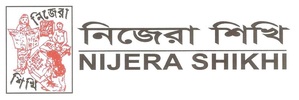A brief history of Nishi and adult literacyOrigins
Nijera Shikhi, was founded in the 1990's by John Hastings to eradicate illiteracy from Bangladesh. John had a vast experience of adult literacy work and in his retirement realised that conventional ways of working would not free Bangladesh from illiteracy and so set about developing a new way of working. At that time about 70% of adults in Bangladesh were illiterate and population growth meant that there were two million new illiterate adults every year. John's view was that schemes that enabled just a few hundred thousand people to become literate, did as much harm as good as they gave the illusion of progress when all the time the situation was getting worse. What was needed was a very low cost way of operating that would enable about 70 million adults to become literate. To achieve this a people's movement modality was developed combined with a very effective method of self-education - Nijera Shikhi is Bangla for “Let's teach ourselves”. By the late 1990's Nijera Shikhi had enabled more than one million people to become literate with the help of 40,000 volunteer members of the movement. Costs were extremely, low at £1.20 per learner – about one twentieth of conventional ways of operating. Diversification With the untimely death of John Hastings in 1998 and the loss of his leadership, Nijera Shikhi survived but struggled to stay true to its original purpose. With changes in government policy to literacy, Nijera Shikhi's focus evolved to more child centred education, revolving loans and income generation projects - all very important but not developing literacy. Re-starting adult literacy Andy Cawthera, who has since worked at DFID, the World Bank and DfE, Marina Svistak, an Investment manger economist at New Philanthropy Capital Impetus-PEF and Munsur Rhaman, a former Programme Manager at Nijera Shikhi and education consultant to UNICEF in Bangladesh are now starting work to fulfil John's wish to use his methods to realise the vision of a literate Bangladesh. Early in 2014 scoping visits were made to two places in rural Bangladesh, to ascertain need and feasibility. Further visits were made in February 2016 with the hope of making initial steps to re-start the movement's activities during 2106. |
|
|
- Welcome
-
Nijera Shikhi Bangladesh
-
Projects
>
- Adult Literacy
- Pre-Primary Education
- Rev. John P Hastings School
- Child Club
- Basic Education for Hard To Reach Urban Working Children (BEHTRUWC)
- Awareness Building Programme
- HIV-AIDS Prevention Programme
- Project Awareness Building program on Natural Calamities and Disaster Management
- Revolving Loan Program
- Arsenic Mitigation Program
- Mini Library and Book Bank
- Sisimpur Outreach Project
- 2013 Annual Report
-
Projects
>
-
Nishi-Adult Literacy
- Donate


